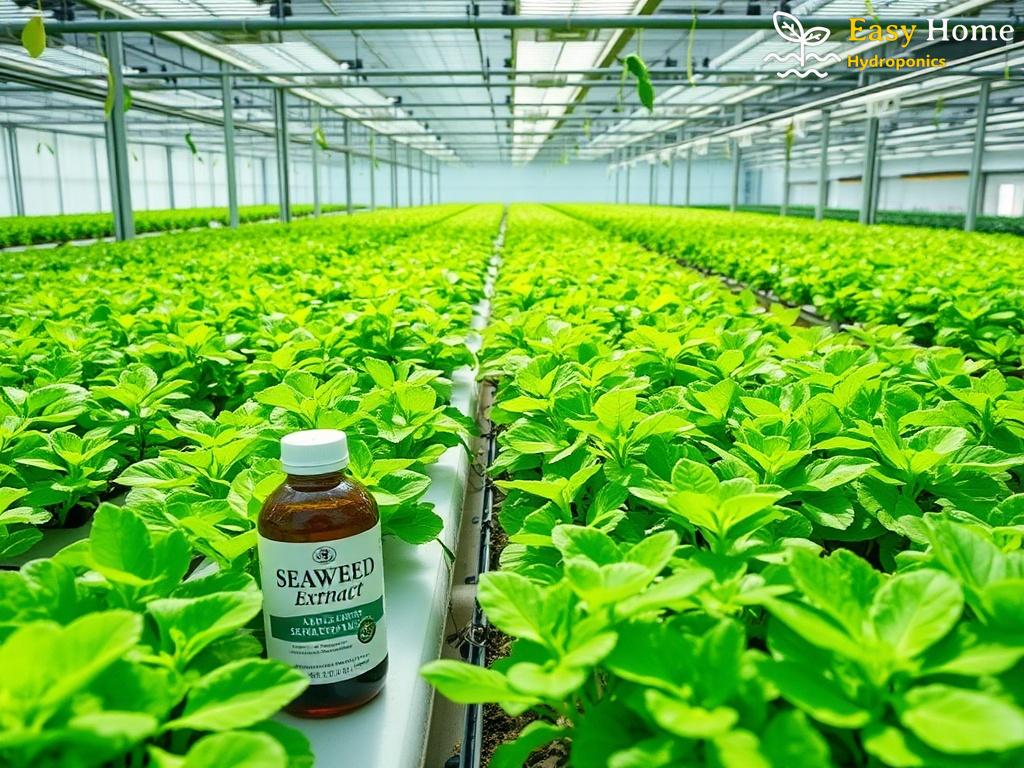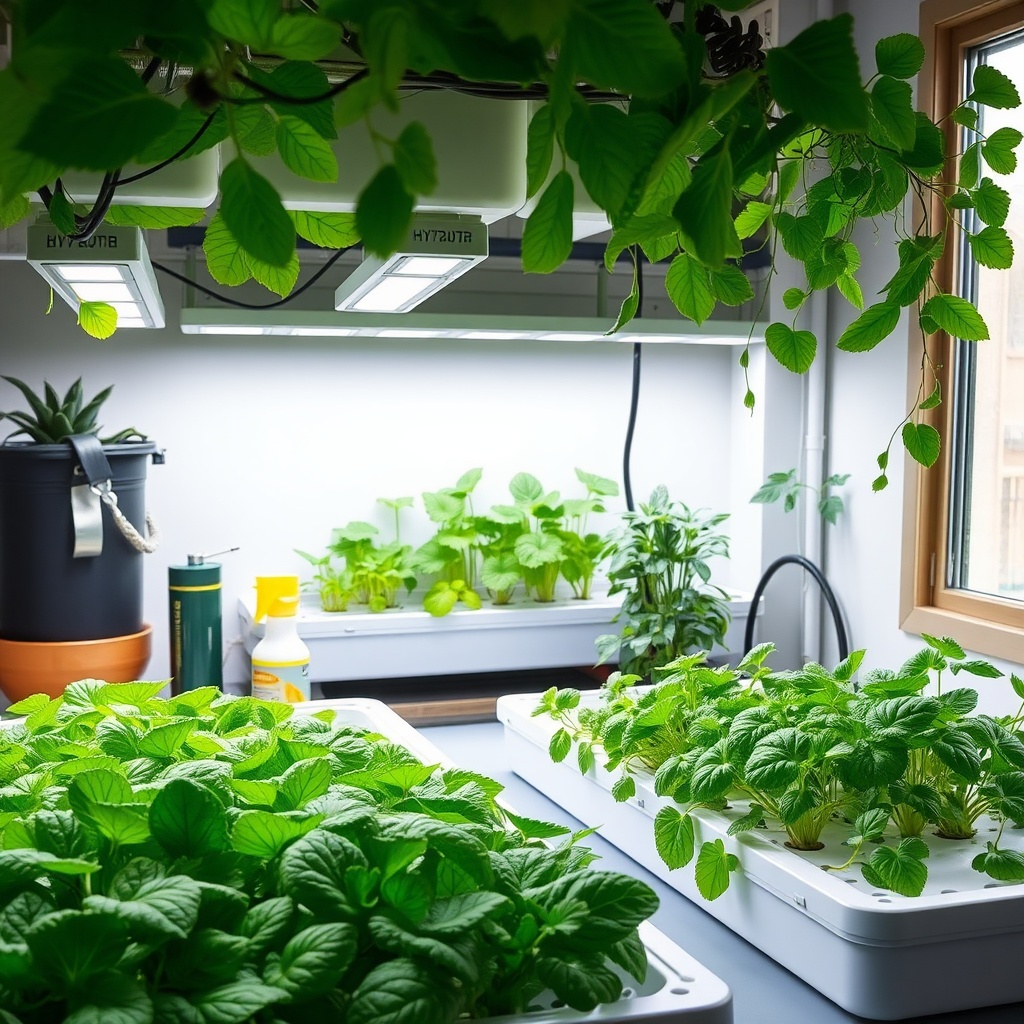Unlocking Nature’s Armor: Seaweed Extracts and Pest Resistance

In the realm of sustainable agriculture, seaweed extracts are emerging as a powerful ally in the fight against pests. These natural wonders are rich in bioactive compounds that not only nourish plants but also enhance their defenses. Farmers and researchers alike are now exploring how these marine marvels can be utilized in hydroponic systems to produce resilient crops.
The secret behind the efficacy of seaweed extracts lies in their unique composition. These extracts contain a variety of nutrients, vitamins, and phytohormones that stimulate plant growth and fortify their immune systems. When applied to hydroponic crops, they can:
- Boost Plant Immunity: Seaweed extracts trigger the production of defense-related proteins, helping plants ward off pests and diseases.
- Enhance Nutrient Uptake: The bioactive compounds improve the plant’s ability to absorb essential nutrients, promoting overall health and resilience.
- Stimulate Growth: Seaweed extracts encourage vigorous growth, making plants less susceptible to pest infestations.
In addition to these benefits, studies have shown that crops treated with seaweed extracts exhibit lower levels of pest damage compared to untreated plants. This natural approach not only reduces the need for chemical pesticides but also promotes a healthier growing environment.
The integration of seaweed extracts into hydroponic systems is revolutionizing the way we approach pest management. As the demand for sustainable agriculture continues to rise, the use of natural solutions like seaweed extracts is set to play a crucial role.
With ongoing research, we are only beginning to unlock the full potential of these marine extracts. Farmers who adopt this innovative method stand to gain not only from reduced pest issues but also from healthier crops and a more sustainable farming practice.
Nutrient Powerhouse: How Seaweed Enhances Crop Vigor

In the quest for sustainable agriculture, seaweed extracts are gaining recognition not just for their pest resistance properties but also for their incredible potential as a nutrient powerhouse. These marine treasures are packed with essential nutrients that not only sustain plant health but also enhance their overall vigor, leading to robust crop yields. This nutrient density is a game changer for hydroponic systems, where the right balance of nutrients is critical for thriving plants.
Seaweed extracts are a rich source of macro and micronutrients, including nitrogen, phosphorus, potassium, calcium, magnesium, and trace elements. When integrated into hydroponic systems, they serve as a natural fertilizer, significantly improving nutrient availability. The *bioactive compounds* present in seaweed stimulate plant metabolism, promoting vigorous growth and increasing biomass. This means crops can grow larger and stronger, which translates to improved pest resistance and higher yields.
Understanding how seaweed extracts empower growth requires a closer look at their nutrient profile. The presence of *auxins, cytokinins, and gibberellins*—natural plant hormones found in seaweed—plays a pivotal role in regulating growth processes. These hormones not only enhance root development but also promote leaf expansion and flowering, which are crucial for optimal crop performance. The synergistic effect of these nutrients ensures that plants can better withstand environmental stressors, making them less vulnerable to pests and diseases.
Research indicates that crops treated with seaweed extracts show a marked increase in chlorophyll production. This increased chlorophyll not only enhances photosynthesis but also improves the plant’s ability to convert sunlight into energy. The result is a more vigorous plant that is better equipped to handle pest pressures while maximizing nutrient absorption.
The integration of seaweed extracts into hydroponic farming systems is setting a new standard for sustainable practices. By harnessing the power of these nutrient-rich extracts, farmers can cultivate crops that not only thrive in controlled environments but also exhibit remarkable resilience to pests. This shift towards natural solutions in agriculture is essential as it aligns with global efforts to reduce chemical inputs and promote environmentally friendly farming practices.
In conclusion, the nutrient-rich profile of seaweed extracts not only enhances crop vigor but also fortifies plants against potential pest threats. Embracing these natural solutions can lead to healthier crops, improved yields, and a more sustainable agricultural future. As research continues to unveil the myriad benefits of seaweed, its role in hydroponics will undoubtedly expand, paving the way for innovation in crop management.
The Science Behind Seaweed: Boosting Hydroponic Plant Immunity
The reliance on traditional pesticides has long been a staple in agriculture, but the future points toward more sustainable practices. Seaweed extracts are at the forefront of this agricultural innovation, offering a natural way to enhance plant immunity, especially in hydroponic systems. By delving into the science of seaweed, we uncover how these marine extracts are not merely fertilizers but transformative agents that can significantly bolster crops against pests and diseases.
Unleashing Bioactive Compounds: A Natural Defense Mechanism
Seaweed is rich in bioactive compounds, such as polysaccharides, phenolics, and flavonoids, which play a critical role in enhancing plant resistance. When applied to hydroponic systems, these compounds serve as signaling molecules that activate the plant’s defense pathways. This activation results in the synthesis of protective proteins and secondary metabolites, effectively arming the crops against potential threats. The application of seaweed extracts can lead to a remarkable increase in the production of pathogen-fighting proteins, which act as the plants’ first line of defense.
Stimulating Systemic Acquired Resistance (SAR)
The interaction between seaweed extracts and plants goes beyond immediate defense responses; it also encourages a phenomenon known as Systemic Acquired Resistance (SAR). This process essentially ‘educates’ plants to recognize and respond to future threats more effectively. By priming the plant’s immune system, seaweed extracts enable crops to prepare for pest invasions or disease outbreaks, reducing the overall impact. Research shows that crops treated with these extracts exhibit heightened resistance not only during the initial exposure to pests but also in subsequent encounters, leading to a long-lasting protective effect.
Integrating Seaweed Extracts: A Paradigm Shift in Hydroponic Practices
The integration of seaweed extracts into hydroponic farming is not just a trend; it represents a paradigm shift in how we cultivate crops. Employing these natural boosts to immunity can significantly reduce the reliance on chemical pesticides, promoting a healthier environment both for crops and consumers. As hydroponic systems often face unique challenges, such as nutrient imbalances and pest pressures, the use of seaweed extracts emerges as a comprehensive solution that addresses multiple layers of crop health.
To illustrate the benefits, consider the following comparative insights:
| Aspect | With Seaweed Extracts | Without Seaweed Extracts |
|---|---|---|
| Plant Immunity | Enhanced through bioactive compounds | Standard, with chemical reliance |
| Growth Rate | Increased due to hormone stimulation | Variable, often slower |
| Pest Resistance | Significantly higher | Lower, more susceptible |
In conclusion, the scientific exploration of seaweed extracts reveals their multifaceted benefits for enhancing plant immunity in hydroponic systems. As farmers increasingly seek sustainable alternatives to conventional practices, seaweed extracts offer a promising avenue for cultivating resilient crops that stand robust against pests and diseases.
Sustainable Solutions: Eco-Friendly Pest Management with Seaweed
As the global agricultural landscape shifts towards sustainability, innovative solutions are at the forefront of this transformation. Seaweed extracts offer a compelling alternative to traditional pest management strategies, enabling farmers to cultivate healthy, robust hydroponic crops while minimizing environmental impact. In this context, the use of seaweed extracts not only addresses pest challenges but also aligns with eco-friendly practices that are essential for the future of farming.
Seaweed extracts serve as a natural deterrent to pests, thanks to their unique biochemical properties. By incorporating these extracts into hydroponic systems, farmers can unlock a host of benefits that contribute to a healthier growing environment. Not only do these extracts boost plant health, but they also create an unfriendly atmosphere for pests. The bioactive compounds within seaweed, such as alginic acid and mannitol, can disrupt pest feeding patterns and reproduction, thereby reducing their populations.
What makes seaweed extracts a standout choice for pest management is their multifaceted approach to enhancing crop resilience. When plants are treated with seaweed extracts, they not only become better equipped to fend off pests, but they also experience a suite of additional advantages:
- Enhanced Plant Health: The nutrients and hormones in seaweed extracts bolster overall plant vigor, making them less attractive to pests.
- Soil Health Improvement: Seaweed extracts contribute to beneficial microbial activity in hydroponic systems, promoting a balanced ecosystem.
- Reduced Chemical Inputs: By relying on natural pest management solutions, farmers can significantly decrease their use of synthetic pesticides.
- Environmental Sustainability: Seaweed is a renewable resource, making its use in agriculture an environmentally friendly practice.
These benefits collectively contribute to a sustainable pest management strategy that not only protects crops but also nurtures the environment.
As we look to the future, the integration of seaweed extracts into hydroponic farming is poised to redefine pest management approaches. The ongoing research into the efficacy of these marine wonders will likely unveil even more applications, enabling farmers to adapt their practices in line with eco-friendly standards. By embracing seaweed extracts, the agricultural community can take significant strides toward sustainable farming that benefits both crops and the planet.
From Ocean to Garden: The Role of Seaweed in Hydroponic Success
In the quest for sustainable agricultural practices, the application of seaweed extracts in hydroponic systems has emerged as a revolutionary approach, transforming how we cultivate crops. These marine-derived solutions not only provide essential nutrients but also enhance pest resistance, making them invaluable in modern farming. By tapping into the ocean’s bounty, farmers are discovering that seaweed can significantly elevate the success of hydroponic gardens.
The journey of seaweed from the ocean to the garden is more than just a physical transition; it represents a powerful synergy between nature and technology. Seaweed extracts are packed with a plethora of vitamins, minerals, and bioactive compounds that strengthen plants at their core. These elements work in harmony to promote healthy growth, enhance nutrient uptake, and fortify plants against potential pest threats. When seaweed extracts are introduced into hydroponic systems, they unleash a cascade of benefits that contribute to the overall vigor of the crops.
For instance, the presence of natural growth hormones in seaweed, such as auxins and cytokinins, stimulates root development and boosts cell division, leading to more robust plants that are better equipped to withstand environmental stresses. As a result, crops grown with seaweed extracts not only exhibit greater resilience to pests but also demonstrate improved yield potential.
One of the most fascinating aspects of integrating seaweed extracts into hydroponics is their ability to foster an ecosystem of defense. When plants are treated with these extracts, they trigger a chain reaction that enhances their immune responses. The bioactive compounds present in seaweed act as signaling molecules, activating the plant’s defense pathways and enabling them to produce protective proteins that deter pests.
This natural mechanism not only helps in mitigating pest infestations but also prepares the plants for future challenges. Research indicates that crops fortified with seaweed extracts show a marked increase in Systemic Acquired Resistance (SAR), allowing them to ‘remember’ prior encounters with pests and respond more effectively to subsequent threats. The outcome is a sustainable cycle where healthier plants lead to fewer pest issues, ultimately reducing the need for chemical interventions.
| Aspect | With Seaweed Extracts | Without Seaweed Extracts |
|---|---|---|
| Plant Health | Enhanced growth and vigor | Standard growth |
| Pest Resistance | Significantly higher | Lower susceptibility |
| Environmental Impact | Eco-friendly and sustainable | Higher chemical usage |
As we continue to explore the transformative role of seaweed in hydroponics, it becomes increasingly clear that this approach is not just a passing trend but rather a fundamental shift in agricultural practices. By leveraging the unique properties of seaweed extracts, farmers can cultivate crops that are not only productive but also resilient and environmentally friendly. In a world where sustainability is paramount, the journey from ocean to garden is paving the way for a brighter agricultural future.




